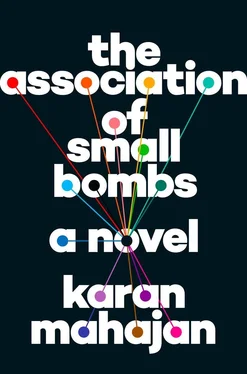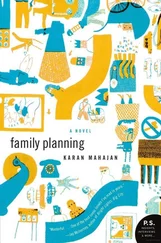Then one day he was brushing his teeth in his dorm sink when he heard a commotion — a rare sound for this time of the morning. Wiping his mouth, he went down to the main lounge, a wide rectangular room broken by driving asbestos-smeared pillars. Boys and girls were draped on the sofa in their athletic wear — shorts, sweatshirts, T-shirts — watching TV. They had smiles on their faces, which Mansoor quickly realized were the tight expressions that came before tears.
Planes had crashed into the World Trade Center.
“Shit,” Mansoor said, though he couldn’t really feel anything.
________
Things began to change immediately on the pristine campus with its clear fountains like lucid dreams of the earth. People discussed the hijackers, who were all Muslims (the hijackers had made no effort to hide their identities, which had been radioed back by the flight attendants, who knew their seat numbers); and talked about Islam and its connection to violence. Mansoor felt uncomfortable, felt he was being looked at in a new way, but also felt he ought to stay clear of the debate. When he said hello to acquaintances as they marched past in the dorm, they didn’t wave back.
“Are you OK my laad? My son?” his mother asked on the phone.
“I’m in California, Mama, nothing’s happening here.”
“They’re saying al-Qaeda wants to blow up the Golden Gate Bridge. Don’t go there.”
“No one walks on the bridge. It’s very far from my campus. People drive on it.” Like many immigrants, he too had felt let down by the bridge.
Still, back in the dorm, the little confidence he’d gained was gone — the wit wilted away from sentences and he was entrapped by his own thickening accent, which people suddenly found impossible to understand. He wanted to tell them about his own experiences with terror, but in those days after 9/11, when panic ruled the campus, and administrators warned students not to even accidentally drink water from a public faucet, since al-Qaeda was planning chemical warfare next, he did not get the opportunity.
Then one day, he was sitting in the dining hall with Alex, a polymathic Jewish boy from Boston who was interested in all the international students and also liked flooring them with his intimate knowledge of their countries, when he began speaking. Alex had been quizzing Mansoor about Sikh separatism. “It’s strange for me to hear all this talk about terrorism,” Mansoor said. “I was actually in a car bombing when I was young.” Once he started, he couldn’t stop. The story poured out. Telling it to a foreigner, in another language, having to put it in context — this made it small, exotic, alien, and terrifying. “The shop fronts had mirrors on them,” he said, realizing how odd it had been. “It was a fashion. And the mirrors blew up and the shards cut up people’s faces. I was very lucky. The worst thing that could have happened long term, apart from losing a limb, was damaging my ears. Your eardrums get blown out and you develop tinnitus, where you can hear a buzzing sound constantly. That didn’t happen. But I did get a similar kind of pain in my wrist and arm. It was like a buzzing.”
“Shit, Mansoor-mian,” Alex said, spooning his hot pea soup. “Do you still have it?”
“No, thank God, though it took years to heal.”
________
After that, Mansoor thought things would change for him, but nothing did. People did not care about a small bomb in a foreign country that had injured a Muslim, and why should they? They were grieving. Three thousand of their countrymen had perished. Why would they look outward? Mansoor stopped talking about it and concentrated on his work.
One night in the computer cluster in the basement of the dorm — a rank space that had clearly once been a boiler room; one wall was a jungle gym of gurgling pipes — a girl sitting next to him, a thin black-haired girl in an alluring tank top and shorts that had SANTA CLARA U stenciled on the buttocks (he had seen it when she got up to adjust the shorts), turned to him. She asked if he knew how to retrieve e-mails from the trash in Pine. Her manner was neutral and friendly and Mansoor was overjoyed. “Of course,” he said, and leaned over the desk. “Just click here.” She held back from the screen, blinking liquidly.
“Thank you so much,” she said when he was done.
“Of course.”
But when Mansoor went back to typing at his terminal, he heard her stirring again.
“Hi, I’m Emma,” she was saying to the curly-haired white boy on the other side of her — a boy also in a tank top, playing Quake on the screen.
“Daniel.”
That was all. The next day Mansoor complained to his friend Irfan at the campus Starbucks. “To them I’m either a computer programmer or a terrorist.”
Irfan was a stocky boy with a limp that made him look oddly rakish and wise for his age. “American women are like that,” Irfan said, twirling a wet Frappuccino bottle. “You have to fuck them first before they talk.”
Irfan had a particular way of making his disaffection cool, and Mansoor hung out with him for a few weeks, before tiring of his misogyny and his habit of wanting to borrow Mansoor’s problem sets. Soon after, Mansoor returned to programming with a vengeance.
________
He worked steadily for the next year. He had decided to become an exceptional programmer on par with Bill Joy and Steve Wozniak. Keeping a copy of The Fountainhead by his side, he rapped away at the keyboard into the night.
Then, one day, during his sophomore year, while programming Boggle for a Programming Methods class, his wrists started to ache.
His wrists had ached off and on ever since the Lajpat Nagar blast — Jaya, in her pedantic way, had warned him that such deep-seated pain, at the level of the tissues, where the cells and nerves themselves had been singed, did not go away easily, and he was supposed to keep up his wrist and arm exercises, lying on a yoga mat and lifting one-kilogram weights in contorted poses. Of course, he hadn’t. Exercise bored him — why run if you weren’t being chased? — and he’d been caught up in the ardor of college. Now the flaring pain sent vectors of electricity up and down his right arm. In the unintelligible void of his muscles danced a thousand pins and needles. “Don’t panic,” he told himself. But what scared him was that the left wrist, weak from all that typing, could barely continue on its journey along the valleys and plateaus of the keyboard. His neck ached.
After a few days of this (within three days, he was totally unable to type) he went to see the physiotherapist at the campus health center. Sitting among fragrant potted plants, amazed by how similar the place looked to the physiotherapy center in India, though the two countries were ten thousand kilometers and eons of income apart, he was careful to explain how it had happened, his history with the bomb — careful to separate himself from the other namby-pambies who came to see her. The physiotherapist, a bright and squat pregnant woman with blond hair and enormous overworked arms, put his arms one at a time in a hot bath of wax, so that a skin of hot wax hardened on them. It was like having another skin. “The heat will be good for you,” she said. After a while, she cut the wax away softly with a butter knife — it was a pleasing sensation — and she gave him printouts showing exercises and different relaxation techniques and told him he would be totally OK.
But Mansoor’s pain didn’t get better. It got worse. A few weeks after his visit to the physiotherapist, he woke up in the middle of the night with his arms radiant and loud with electricity. The massive hunk of Eddy from San Antonio snored in the upper bunk. When he got up to go to the bathroom, sparks shot up his sciatic nerve and numbed his leg, and he stumbled.
Читать дальше












